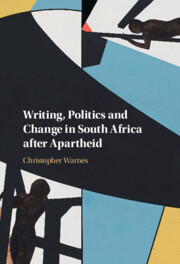29 results
Chapter 4 - Indigenous Knowledge and the Narrative Art of Recuperation
-
- Book:
- Writing, Politics and Change in South Africa after Apartheid
- Published online:
- 08 August 2023
- Print publication:
- 08 June 2023, pp 119-150
-
- Chapter
- Export citation
Chapter 3 - Writing Crime
-
- Book:
- Writing, Politics and Change in South Africa after Apartheid
- Published online:
- 08 August 2023
- Print publication:
- 08 June 2023, pp 92-118
-
- Chapter
- Export citation
Chapter 6 - Xenophobia and Xenophilia
-
- Book:
- Writing, Politics and Change in South Africa after Apartheid
- Published online:
- 08 August 2023
- Print publication:
- 08 June 2023, pp 181-202
-
- Chapter
- Export citation
Conclusion
-
- Book:
- Writing, Politics and Change in South Africa after Apartheid
- Published online:
- 08 August 2023
- Print publication:
- 08 June 2023, pp 203-208
-
- Chapter
- Export citation
Chapter 5 - Love in the Time of Land Reform
-
- Book:
- Writing, Politics and Change in South Africa after Apartheid
- Published online:
- 08 August 2023
- Print publication:
- 08 June 2023, pp 151-180
-
- Chapter
- Export citation
Contents
-
- Book:
- Writing, Politics and Change in South Africa after Apartheid
- Published online:
- 08 August 2023
- Print publication:
- 08 June 2023, pp vii-vii
-
- Chapter
- Export citation
Chapter 2 - Empowerment
-
- Book:
- Writing, Politics and Change in South Africa after Apartheid
- Published online:
- 08 August 2023
- Print publication:
- 08 June 2023, pp 62-91
-
- Chapter
- Export citation

Writing, Politics and Change in South Africa after Apartheid
-
- Published online:
- 08 August 2023
- Print publication:
- 08 June 2023
Dedication
-
- Book:
- Writing, Politics and Change in South Africa after Apartheid
- Published online:
- 08 August 2023
- Print publication:
- 08 June 2023, pp v-vi
-
- Chapter
- Export citation
Bibliography
-
- Book:
- Writing, Politics and Change in South Africa after Apartheid
- Published online:
- 08 August 2023
- Print publication:
- 08 June 2023, pp 209-222
-
- Chapter
- Export citation
Introduction
-
- Book:
- Writing, Politics and Change in South Africa after Apartheid
- Published online:
- 08 August 2023
- Print publication:
- 08 June 2023, pp 1-34
-
- Chapter
- Export citation
Acknowledgements
-
- Book:
- Writing, Politics and Change in South Africa after Apartheid
- Published online:
- 08 August 2023
- Print publication:
- 08 June 2023, pp viii-xii
-
- Chapter
- Export citation
Chapter 1 - ‘Step Up for Your Hustle’
-
- Book:
- Writing, Politics and Change in South Africa after Apartheid
- Published online:
- 08 August 2023
- Print publication:
- 08 June 2023, pp 35-61
-
- Chapter
- Export citation
Index
-
- Book:
- Writing, Politics and Change in South Africa after Apartheid
- Published online:
- 08 August 2023
- Print publication:
- 08 June 2023, pp 223-236
-
- Chapter
- Export citation
Copyright page
-
- Book:
- Writing, Politics and Change in South Africa after Apartheid
- Published online:
- 08 August 2023
- Print publication:
- 08 June 2023, pp iv-iv
-
- Chapter
- Export citation
Chapter 1 - Magic and Otherness
- from Part I - Origins
-
-
- Book:
- Magical Realism and Literature
- Published online:
- 22 October 2020
- Print publication:
- 12 November 2020, pp 13-29
-
- Chapter
- Export citation
Contents
-
- Book:
- Magical Realism and Literature
- Published online:
- 22 October 2020
- Print publication:
- 12 November 2020, pp vii-viii
-
- Chapter
- Export citation
Part II - Development
-
- Book:
- Magical Realism and Literature
- Published online:
- 22 October 2020
- Print publication:
- 12 November 2020, pp 99-238
-
- Chapter
- Export citation
Bibliography
-
- Book:
- Magical Realism and Literature
- Published online:
- 22 October 2020
- Print publication:
- 12 November 2020, pp 357-385
-
- Chapter
- Export citation
Copyright page
-
- Book:
- Magical Realism and Literature
- Published online:
- 22 October 2020
- Print publication:
- 12 November 2020, pp vi-vi
-
- Chapter
- Export citation



